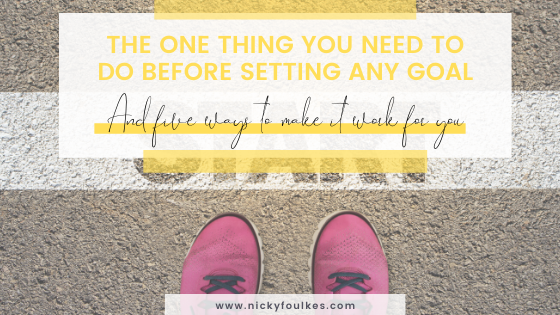2020 is in full swing. A new year. A time when we traditionally set goals, intentions, or as we like to call them, resolutions.
We resolve to be better.
Do better.
Think better.
Act better.
We decide we want to be a better version of us and a new year is like a clean slate – a time to reflect on the past 12 months and decide what we want to achieve in the upcoming year.
New year, new you
While I believe you can set and start working towards a goal at ANY time of year, and on ANY day of the week (not just Monday peeps!) I understand the pull of the new year to start afresh.
We often see opening the door into a new year as an opportunity to open the door onto a new us. New Year, new you, right?
There is, however, one fundamental thing we need to do before setting a goal.
One thing that many of us fail to do and that can truly make the difference between finally meeting a goal or throwing in the towel. Again.
Where are you right now?
Before we set any tangible goals, we need to assess where we are RIGHT NOW.
Think of a goal like setting a destination into a GPS. Yes, we need to know where we’re heading to (our destination), but oftentimes we don’t actually assess where we are.
Our starting point.
Without taking this into account, we’re missing a crucial step.
You can set a destination into a GPS, but if you don’t know your starting point, there’s no way of knowing how to get there.
What’s the best route to take?
What are the actions that can get us to our goal?
Why do we overlook this step?
I believe we overlook this step because it can be uncomfortable to face where we are right now and assess our current situation.
We know we’re not where we want to be (otherwise we wouldn’t have a goal in the first place). But to look at how far removed we are from our desired destination can be a hard pill to swallow.
But a bit of real talk here. We have to toughen up and face our current situation to be able to make any progress in the direction of our goal.
Yes, it might be uncomfortable, confronting, intimidating and may even stir up some emotions we don’t want to face, but we need a starting point. We need a tangible basis to be able to measure our progress.
We can’t overcome what we won’t face.
We need to get comfortable with getting uncomfortable.
Five steps to make your starting point work for you:
- Don’t let it discourage you. As tough as this can be, your starting point doesn’t define who you are or who you’re becoming. It’s simply a measurement of your results this far. It’s an accumulation of the action you have (or haven’t) taken up until this point, but that does not mean this is where you will be stuck forever.
- Use it as motivation. Rather than getting bogged down by your lack of results, use your starting point as motivation to push you towards your goal. If you’re currently at a 1 out of 10 for how you want to think, feel or behave, imagine where you’ll be if you keep pushing forward and taking steps towards your goal. Where you are now is the ‘worst’ position you’ll ever be in. It’s only onwards and upwards from here.
- Don’t compare your chapter one to someone else’s chapter 10. Comparison is the killer of so many dreams. Just because you see someone with what you perceive as your ‘dream life’, resist the urge to compare. There are no overnight successes. That person you look up to has done the hard yards, battled their own inner demons and worked their butt off to get to where they are. Only use other’s results as inspiration for what can be achieved. Otherwise, stay in your own lane, focus on your own actions and you will get your own results.
- You’ll be able to see how far you’ve come. Sometimes, when we finally achieve a goal, it can honestly be a bit of anti-climax. We may have been plugging away for so long that we don’t recognise how much progress we’ve made. It’s like seeing a baby grow into a toddler. If they’re with us every day, we don’t see the changes because they’re so incremental. If a family member only sees them every six months, they see a BIG change. So, when you reach a goal, it’s always encouraging to look back at where you started from. You’ll be surprised at just how far you’ve come and you’ll be able to see just how much you actually achieved.
- You can use it to inspire others. Once you’ve achieved your goal, you can use it as evidence of your hard work both for yourself for your future endeavours and for the benefit of others. You can prove what’s achievable when you remain consistent and put in the hard work.
Over to you
So, what goal are you working on and what do you need to get real about right now? Tell me in the comments below or write it in a journal.
If it brings up feelings of discomfort, that’s OK. Don’t beat yourself up. It’s in our discomfort that we grow. Celebrate your commitment to improvement.
Enjoy this post? You may also like these blog posts:


Recent Comments